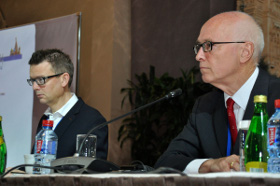Meeting at the CIBJO Congress in Moscow, the Precious Metals Commission discussed at length the issue of the Dodd-Frank Act in the United States and how it affects the jewellery industry’s use of gold in particular. It also reviewed the proposals on the issue from the European Union.
Susan Flamm, Senior Counsel at the U.S. Jewelers Vigilance Committee (JVC), spoke about the Dodd-Frank Act and how the legislation impacts publicly-held American companies which must report to the Securities and Exchange Commission on the gold they use in their products and where it is sourced. Publicly traded companies must submit filings with the due diligence efforts they have made on the issue by June 2, she explained.
Although there are only about 30 American companies which need to file, but problems arise from the fact that there are thousands firms supplying those companies.Each has to make extensive efforts to find out about suppliers – and companies which are, in turn, supplying them.
Flamm said the legislation has caused great confusion – and expense. A product is not necessarily conflict free if it has traveled through the Democratic Republic of Congo or neighbouring states. “Due diligence has to be in place to ensure that the minerals did not finance conflict,” she said.
She explained that various trade bodies such as chambers of commerce had filed court cases regarding the provisions of the law, saying that the demand that they place labels saying that the jewellery does not contain gold from the DRC was against the First Amendment of the U.S. Constitution, which upholds the right to free speech.
However, an appeal court struck down most of the claims but asked that a lower court again look at the issue and how the wording can be changed and brought in line with the right to free speech, she said.
Commission President Michael Allchin said the U.S. government had pressured the EU to create similar legislation. However the EU was taking a different approach, looking at minerals defined by the OECD from anywhere in the world.
He said also that, due to the large demands of the Dodd-Frank Act, many companies that traded legitimately in the DRC and neighbouring states have pulled out, leaving the field free for gangsters to take control, leading to exploitation, child labor and other human rights abuses.
Mr. Allchin recounted how, along with CIBJO President Gaetano Cavalieri, he had travelled to the EU to discuss proposed legislation. The EU approach is to create a list of refiners and smelters which are operating legitimately with which jewellery companies should do business.
There was also a discussion on the issue of nickel and the EU nickel directive in 1998 that is being replaced by a 2011 directive. It was proposed that CIBJO members urge their National Standards Bodies to seek a temporary suspension of Appendix One of EN1811:2011 and a reintroduction of the 1998 directive. And also to seek compliance from national governments that products already in the supply chain before March 31, 2013 which comply with EN1811:1998 be regarded as compliant.
Mr. Allchin said that the CIBJO Congress in 2013, members had been asked to approach their national EU authorities on the issue and they had successfully done so.
Mr. Allchin notified members that he had decided to step down as Precious Metals Commission President and proposed that Stella Layton, Chief Executive and Assay Master at the Birmingham Assay Office in the United Kingdom, replace him until the 2015 Congress in Brazil, where new elections for the position will be held.
Photo Caption: Michael Allchin (right), President of the Precious Metals Commission, and John Henn, of the National Association of Goldsmiths of the United Kingdom, during the session of the Precious Metals Commission in Moscow.

